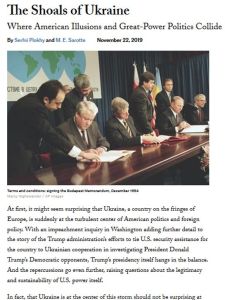Join getAbstract to access the summary!

Join getAbstract to access the summary!
Serhii Plokhy and Mary Elise Sarotte
The Shoals of Ukraine
Where American Illusions and Great-Power Politics Collide
Foreign Affairs, 2019
What's inside?
Only history can explain Ukraine’s significance in US politics today.
Recommendation
The story of the Trump administration’s purported attempts to make aid to Ukraine a quid pro quo for help investigating the president’s political rivals placed that country front and center in US headlines for weeks. But historical memory is short. Full appreciation of Ukraine’s geopolitical significance for both US and Russian policy makers requires a review of the fateful years immediately following the dissolution of the Soviet Union. In Foreign Affairs, Serhii Plokhy and M.E. Sarotte explain how Ukraine has become a focal point of both US-Russian frictions and US domestic politics.
Summary
About the Authors
Serhii Plokhy is professor of Ukrainian History and director of the Ukrainian Research Institute at Harvard University. M.E. Sarotte is Distinguished Professor of Historical Studies at Johns Hopkins University and the author of The Collapse: The Accidental Opening of the Berlin Wall.



















Comment on this summary